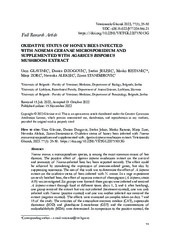Приказ основних података о документу
Oxidative status of honey bees infected with Nosema ceranae microsporidium and supplemented with Agaricus bisporus mushroom extract
| dc.creator | Glavinić, Uroš | |
| dc.creator | Džogović, Danica | |
| dc.creator | Jelisić, Stefan | |
| dc.creator | Ristanić, Marko | |
| dc.creator | Zorc, Minja | |
| dc.creator | Aleksić, Nevenka | |
| dc.creator | Stanimirović, Zoran | |
| dc.date.accessioned | 2023-06-26T08:46:30Z | |
| dc.date.available | 2023-06-26T08:46:30Z | |
| dc.date.issued | 2023 | |
| dc.identifier.issn | 0350-2457 | |
| dc.identifier.uri | https://vet-erinar.vet.bg.ac.rs/handle/123456789/2953 | |
| dc.description.abstract | Nosema ceranae, a microsporidium species, is among the most common causes of bee diseases. The positive effect of Agaricus bisporus mushroom extract on the survival and immunity of Nosema-infected bees has been reported recently. The effect could be achieved by stimulating the expression of immune-related genes, but also by suppressing nosemosis. The aim of this work was to determine the effect of A. bisporus extract on the oxidative status of bees infected with N. ceranae. In a cage experiment on newly hatched bees, the effect of aqueous extract of champignon (A. bisporus, strain A15) was investigated. Six groups were formed: three groups were infected and received A. bisporus extract through food at different times (days 1, 3, and 6 after hatching), one group received the extract but was not infected (treatment control), one was only infected with Nosema (positive control) and one was neither infected nor received the extract (negative control). The effects were examined on samples taken on days 7 and 15 of the study. The activities of the antioxidant enzymes catalase (CAT), superoxide dismutase (SOD) and glutathione S-transferase (GST) and the concentrations of malondialdehyde (MDA) were determined. In comparison to the positive control, the enzyme activities and MDA concentrations were significantly lower in the groups fed with the mushroom extract supplement. In the negative control, the level of oxidative stress was lower than in the positive control. In comparison with the other groups, the values mostly did not differ significantly. The oxidative status of bees infected with N. ceranae was significantly better if they were fed with the A. bisporus extract. | sr |
| dc.language.iso | en | sr |
| dc.publisher | University of Belgrade, Faculty of Veterinary Medicine | sr |
| dc.relation | info:eu-repo/grantAgreement/MESTD/inst-2020/200143/RS// | sr |
| dc.rights | openAccess | sr |
| dc.rights.uri | https://creativecommons.org/licenses/by/4.0/ | |
| dc.source | Veterinarski Glasnik | sr |
| dc.subject | Apis mellifera | sr |
| dc.subject | Nosema ceranae | sr |
| dc.subject | Agaricus bisporus | sr |
| dc.subject | oxidative stress | sr |
| dc.subject | oxidative status | sr |
| dc.title | Oxidative status of honey bees infected with Nosema ceranae microsporidium and supplemented with Agaricus bisporus mushroom extract | sr |
| dc.type | article | sr |
| dc.rights.license | BY | sr |
| dc.citation.volume | 77 | |
| dc.citation.issue | 1 | |
| dc.citation.spage | 35 | |
| dc.citation.epage | 50 | |
| dc.identifier.doi | 10.2298/VETGL220715013G | |
| dc.identifier.fulltext | http://veterinar.vet.bg.ac.rs/bitstream/id/8695/bitstream_8695.pdf | |
| dc.type.version | publishedVersion | sr |

